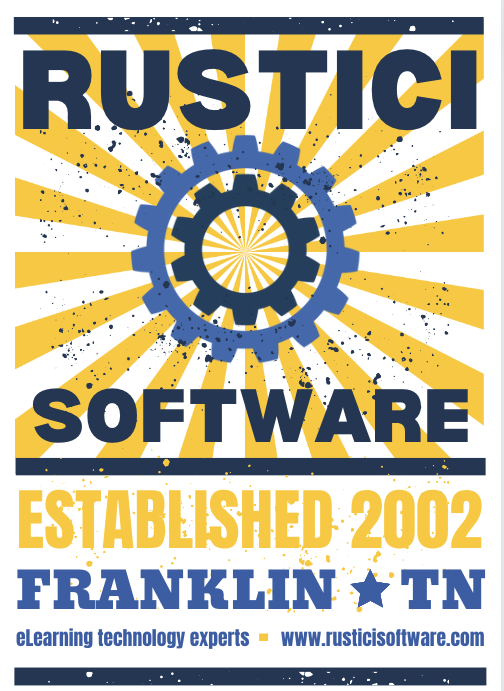Twenty-five sessions. Eight guest speakers. Three days. Three tracks. One hot chicken challenge. Just about two months ago, Rustici kicked off our biggest event yet: Rustici: The Gathering. Or, as we’ve come to call it, RTG because we definitely needed more acronyms around here.
Spearheaded by our marketing team, we had 30 Rusticians (almost 70% of the company!) presenting and working behind the scenes during the event. And those who didn’t directly participate were busy holding down the fort.
This was the first time we’ve hosted an event of this size, and we learned a lot along the way. If you’re planning an online event soon for your customers or learners, maybe our plan for creating magic, along with lessons learned and the technology used, will help you, too.
Gathering goals
From the start, RTG was centered around our customers. We wanted to provide our knowledge and expertise while giving a face to the teams developing our products. But first we had to plan what content is most important to our customers.
My product does that?
Our account management and delight teams often hear “I didn’t know my product does that!” A main RTG goal was to remedy this and help customers assemble their winning product decks.
To see what clients are missing out on, we asked our trusty RTG committee, made up of account managers, delight, sales and developers, for input. From there, we created a Google Form asking for speakers and ideas.
Giving our customers a voice
A lot of our customers are using our products in new and fascinating ways, and we wanted for them to tell their story, share their results and discuss how they’re using our products to achieve their organization’s learning and training goals. We were honored to have customers from AWS Academy – the attendee voted favorite session, SANS Institute, Go1, Sherwin-Williams, Torrance Learning and Watershed LRS. We love when our customers share their journeys and successes!
Engaging attendees with morning coffee chats
One of the best parts of in-person conferences is catching up with our friends, but virtual makes that more challenging. Our account managers were available online each morning. These chats served two purposes: a chance to chat and for attendees to log on early and check for technical difficulties, which helped alleviate one of our biggest concerns.
Dealing out the magic of standards
We love chatting about eLearning standards, so much so that we even have a dedicated Slack channel discussing such acronyms as xAPI, SCORM, LRS and LRP. And we’ve made friends who share in our thrill of talking pedantic about standards. Andy Johnson from the ADL Initiative shared about cmi5 and the TLA, Megan Torrance from Torrance Learning spoke about xAPI and the gnome and George Vilches from Continu talked about migrating content from SCORM to cmi5.
 Bringing the delight
Bringing the delight
When surrounded by developers but choose analog pen and paper, there’s a good chance that some friendly bantering will ensue (I cannot confirm nor deny this happened to me). But there’s one thing we all agree on, handwritten cards create a special feeling. Before we planned anything, we planned to write them. About 100 attendees opted in for a special gift and received cards written by Liz Poston, Elizabeth Mohr and the marketing team with a special appearance by Joe’s face.
What we learned
We learned a lot and think these highlights that might help with your planning:
- Everyone loves a good theme. There’s a reason I’m in marketing. I love a good theme. Turns out, everyone loves it almost as much as I do.
- Give your coworkers their time to shine. Ryan Donnelly missed his calling as a trivia show host. Reed McLean’s presentation creation skills earned him an honorary marketing position. We gave everyone an opportunity to bring their own personality to help illustrate who you’ll be working with and who develops our software.
- When shifting things around, triple check your work. Especially when you have a hot chicken challenge, pay special attention to who’s eating and maybe not schedule them with two sessions immediately afterward (sorry Matt Byrd).
- Sometimes you have to go old school. There’s a beautiful whiteboard at the end of Friendship Hallway that needed a purpose. Cue the markers, rulers, colorful sticky notes and sharpies to plot out the event.
- All the training. Every session had a producer checking that our speakers weren’t on mute and compiling attendee questions. We held multiple training sessions, worked 1:1 with anyone wanting more guidance and wrote out best practices and checklists.
- Plan for contingencies. We had backup plans in place (like recording sessions if the WiFi went out), asking for “on-call” producers and technical support, and scheduling the marketing team strategically so someone could jump in immediately.
Our biggest lesson is one that we continually strive for: having a culture that values its employees and customers. It’s no easy feat asking 70% of your company to participate, create presentations, speak and even demonstrate software live – you’re a brave one Luke Wiedeman, but everyone excitedly jumped right in. We even had two employees working behind the scenes who’d started less than three months before the event.
The magic of technology
We couldn’t have made the conference happen without a little technology help.
- Zoom Events. The new Zoom conference platform allowed us to have two sessions simultaneously and provided one platform for attendees.
- Bridge Advanced Video. With multiple tracks and days, we needed a way to host all our recorded sessions that’s easily accessible. Bridge Advanced Video, our sister company, was the perfect solution.
- Google. From Forms to Slides to good old calendar invites, we used nearly every G-Suite application.
All good things must come to an end
All in all, we had an incredible three-day conference, but once over, there was still a lot to do. We uploaded all the videos to Bridge and emailed links to attendees. We also reviewed the post-event surveys, which inspired our latest live webinar: Ask me anything: xAPI and cmi5 support in Rustici products.
We’re already beginning to plan for RTG 2023, starting with a detailed 10-page project plan (a year is a long time to forget what we did!) and deciding on a date for next year.
Save the date. RTG ‘23 will be July 11-13!


